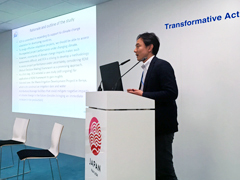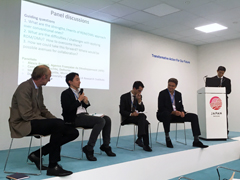Visiting Scholar Narita Discusses a New Approach to Sustainable Development Planning at COP23
2017.12.12
The 23rd Conference of the Parties to the United Nations Framework Convention on Climate Change (COP23) was held in Bonn, Germany from Nov. 6 to 18, 2017. JICA hosted a number of side events in the Japan Pavilion with the aim of contributing to discussions of various matters related to climate change, in light of its experience and knowledge of international cooperation activities in developing countries.
As part of this, JICA held a side event titled, “Making Robust Investment Decisions under Deep Uncertainty: A New Approach to Sustainable Development Planning in Uncertain World” on Nov. 8. JICA-RI Visiting Scholar Daiju Narita, also an associate professor at the University of Tokyo, gave a presentation and participated in the panel discussion under the moderation of JICA’s Ichiro Sato (Deputy Director of the Office for Climate Change, Global Environment Department).

Visiting Scholar Narita introduced JICA’s pilot evaluation study of the Mwea Irrigation Development Project
The focus of the discussion was on the "Decision-Making under Deep Uncertainty (DMDU)" approach. The traditional approach to development planning seeks first to predict the future as accurately as possible and then to identify the optimal options under the conditions of the predicted future. However, the uncertainty about future climate change makes this task very difficult. The DMDU approach has drawn attention in recent years as one of the solutions to this problem. It starts from identifying available strategies and options, and subjects them to stress-testing under a number of possible future scenarios to find the most desirable of them.
Narita gave a presentation titled “Making Robust Investment Decisions Under Deep Uncertainty: Case Study of the Mwea Irrigation Development Project, Kenya.” In it, he introduced JICA’s pilot evaluation study of the Mwea (Kenya) Irrigation Development Project, which utilizes the Robust Decision-Making (RDM) framework. The RDM framework is being tested by JICA as a method of evaluating projects subject to significant uncertainties such as that of climate change. In this case study, the DMDU approach is applied with numerical simulations for a set of hypothetical cases with and without implementation of the project. A comparison of future rice production and income in the region shows that implementing the project would reduce the negative impact of climate change. In other words, the irrigation project would be effective as an adaptation measure against climate change.

The panel reached the consensus to promote the recognition and understanding of the DMDU approach
Sato served as moderator for a panel discussion following the presentation, and Narita participated as a panelist. Critics of the DMDU approach say that it requires sophisticated calculations using large amounts of data and thus is difficult to be widely adopted, and also that because the impact of climate change will only be realized in the future, it is difficult to demonstrate the effectiveness of the strategies and options as identified by this approach. However, it is likely that these criticisms are mostly a reflection of the lack of understanding of this approach by development practitioners and stakeholders in developing countries. Accordingly, the panel reached the consensus that it was necessary to promote the recognition and understanding of the DMDU approach by various stakeholders.

事業事前評価表(地球規模課題対応国際科学技術協力(SATREPS)).国際協力機構 地球環境部 . 防災第一チーム. 1.案件名.国 名: フィリピン共和国.

事業事前評価表(地球規模課題対応国際科学技術協力(SATREPS)).国際協力機構 地球環境部 . 防災第一チーム. 1.案件名.国 名: フィリピン共和国.

事業事前評価表(地球規模課題対応国際科学技術協力(SATREPS)).国際協力機構 地球環境部 . 防災第一チーム. 1.案件名.国 名: フィリピン共和国.

事業事前評価表(地球規模課題対応国際科学技術協力(SATREPS)).国際協力機構 地球環境部 . 防災第一チーム. 1.案件名.国 名: フィリピン共和国.

事業事前評価表(地球規模課題対応国際科学技術協力(SATREPS)).国際協力機構 地球環境部 . 防災第一チーム. 1.案件名.国 名: フィリピン共和国.
scroll